While headlines are screaming about thick, gooey oil washing up on Louisiana's beaches, killing bottlenose dolphins and sea turtles, and "tendrils" of the river of oil are entering the Gulf Stream via the Loop Current for eventual deposit on vulnerable coral reefs in the Florida Straights, a fight for the heart, soul, and life of the Louisiana Delta is raging. The Coast Guard, as one of the branches of the U.S. Armed Forces, seems to be answering to the orders of British Petroleum, banning CBS reporters from Louisiana's Coastal waters, and voices from the Delta are joining together to fight for the lives of some of this country's poorest of the poor.
Amidst additional news that British Petroleum has been slow or negligent in the release of flow data and videos of the catastrophic rupture of the Transocean/Deepwater Horizon wellhead in the Gulf of Mexico, there is another story that is crying for attention. A revered Chief of the Chahta Indians, the youngest brother of the Neville Brothers Band, and a Catholic nun know the stories of the dispossessed Indians, shrimpers, fishermen and women, oysterers and business owners deep in the wetlands and bayous of south Louisiana. They want to be heard.
Chief Warhorse Elwin Gillum, Cyril Neville, and Sister Helen Vinton have been shocked and disheartened by the lack of support for these abandoned populations--people who have been experiencing the lingering effects of hurricanes that go as far back as Hurricane Andrew. Now, the catastrophe resulting from the river of oil that is slamming Louisiana's coastline threatens the culture, physical health, and livelihoods of these forgotten people.
Cyril Neville has long been a powerful, outspoken voice for the dispossessed peoples of Louisiana. In a phone conversation today, Neville explained how he has personally witnessed the poverty and injustice--Native Americans shoved aside and pushed to the edges of society--and afforded no safety net. He is also an Ambassador for the Chahta Indians at the request of Chief Warhorse.
Neville told us how he has been impacted emotionally and spiritually by the plight of the Indian Peoples on the Louisiana delta, and especially in Terrebonne Parish.
"Terrebonne" means "good earth," but the earth and marshes have been washing away since the oil companies dredged miles of canals in the wetlands. The oil catastrophe promises to finish the job as thousands of acres of remaining marshlands face a die-off as tender reeds and grasses are covered with oil from the BP catastrophe.
Neville expressed concern that money raised in concerts and aid benefits is not going directly into the hands of those who most need it. He noted how the quality of life has gone down for most people on the Delta, while the cost of living has skyrocketed. "I can't get the faces of children out of my head," Neville said. "They have little to no medical facilities and the neglect is criminal." This, he added, was before the BP disaster.
I've met people after Hurricanes Rita and Ike who are really beat up bad. I have lived in Louisiana all my life and never realized until recently how a whole segment of people have been left out of society. Someone has to be a voice for the people. Most Americans don't even know what is going on down there.
Moved to be a voice for the voiceless, Neville posted this statement on his website as the official ambassador for the tribes that include descendants of 125 Chahta, Creek and Cherokee who did not leave during the brutal exodus known as the Trail of Tears. Since Hurricane Katrina, members are scattered in at least 29 states.
I'm writing this on behalf of the forgotten People of places like Bob's Town, Bayou Blue, Bayou Black, Island Jean Charles and Shrimpers' Row. I will be performing with the Voice of the Wetlands All Stars at the Gulf Coast concert in New Orleans Sunday, and in all the media surrounding this big event I have read very little about what will be done out of all this for the poor people who live in the areas I mentioned. In fact, these same people have never really recovered from the effects of storms going all the way back to hurricane Andrew. These are our fishermen, our shrimpers, whose means of making a living and providing for their families will be affected by this man made disaster now lurking in the Gulf. I hope this letter will prompt others to find out more about the People who actually live in the Wetlands and their on going agony.
Most of what will be affected along the Gulf Coast from Florida around to Texas is owned by people who are more well-off than those who live where the land is already disappearing hourly. Oil companies, rig owners and builders and refineries will be directly affected but they all have huge insurance contracts to fall back on. It is not so for the shrimpers and fishermen of South Louisiana. What I would like to see come out of this concert is funding for the people of Bob's Town, Island Jean Charles, Bayou Blue, Bayou Black, and Shrimper's Row to help rebuild and sustain their communities. If hearts and minds are in the right place, this will be the outcome. If not, it will be business as usual, and that's something none of us should stand for.
I found out much of what I know about this subject from someone who has been directly involved with the People of each of these areas' recovery efforts and serves as a true Voice of the Peoples of the Wetlands; Queen/Chief Elwin Warhorse Gillum. You can Google her name and be enlightened about many things that have yet to make it to press.Thank you for taking the time to read this.
Ambassador Cyril Neville
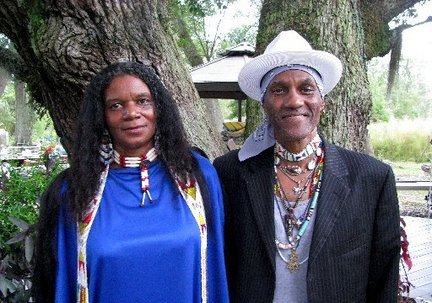
Neville and Chief Warhorse
Chief Warhorse Elwin Gillum told us today that Neville "is a strong-willed person," ready to help her help her people.
Warhorse is the direct descendant of the last Queen of the Tchefuncta Nation, who ruled when the Florida Territory lived under Spanish domination. Chief Warhorse wants to get the word out that after four hurricanes, funding is still a problem for the Delta's poor. People are still living in FEMA trailers, and "trying to make do with a little bit of nothing." As a partial solution, Warhorse says that money needs to be put directly into the hands of the people.
They need to be able to pay their bills: their trailer notes, their boat notes and their rents. There is always so much waste after a disaster. So much money flows through the government but the people who need it never see it.
No one will agree with Chief Warhorse more than Sister Helen Vinton of the Southern Mutual Help Association in New Iberia, Louisiana. We first met Sister Helen shortly after Katrina rolled through Louisiana, and her organization is totally hands-on with helping the forgotten poor of south Louisiana. Vinton is the Assistant Executive Director Of SMHA and a "rural specialist" who works with traditional fishers. This year the shrimping outlook was very good, but that was before the oil crept into the life-giving nurseries of the back bays and bayous, she said.
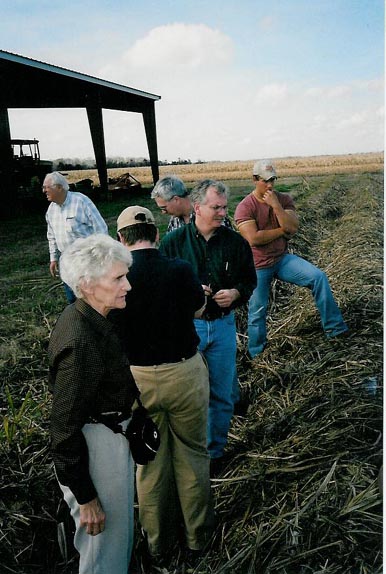
Sister Helen Vinton leading a tour of visiting farmers from 13 states hosted by local Louisiana farms discussing sustainable agriculture practices.
The BP catastrophe is breaking her heart. She talks about the little bait shops, sandwich shops and commercial fisheries in Plaquemines Parish. Plaquemines is the parish with the most combined land and water area in the U.S. state of Louisiana, and is ground zero for oil. The sister of Providence has been with her order for 54 years.
The people really are strapped. They are subject to the whims of British Petroleum. BP has promised $5,000 to shrimpers who can prove that they lost their livelihood. The problem is the paperwork makes impossible to document losses and if you sign, the implication is that this is the final payment.
Then there is the issue of work for pay. Shrimpers are asked to put their boats on standby, but must first sign a contract that they will not work while on call. There is no guarantee that they will be called for the promised $1200 per day for a smaller boat with an additional $100 per deckhand. It sounds like a lot of money until one realizes that filling the tanks with fuel can cost from $500 to $1000. If the boat is called to duty it returns covered in oil and possibly damaged from the floating debris left over from past hurricanes.
Anyone who works on the Louisiana coast is going to be hit hard. There is no way out. When the oil comes in the marshes will be coated with oil and they will eventually wash away as the grasses die. For more than thirty years the oil companies have been devastating the Louisiana Coast and exploiting the coastal waters. This is the nursery for the fisheries and with the influx of salt water the brackish water nurseries will be destroyed. How do you build back land and marshes? The marshes and people have been assaulted.
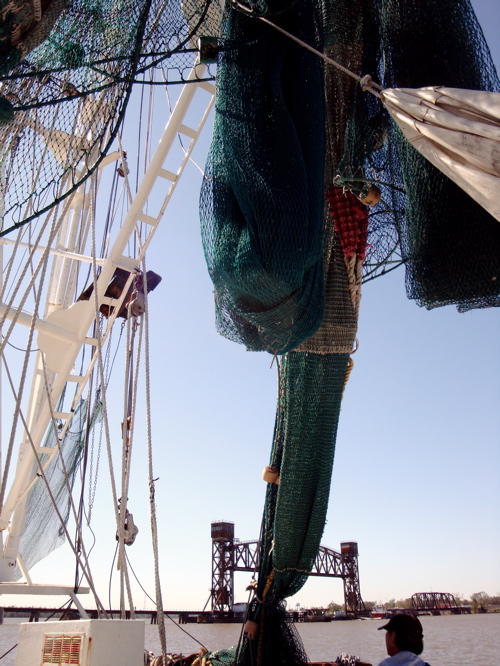
Chief Warhorse said she is also tackling this obfuscation on the part of BP. "It's not an issue of illiteracy. It's not because my people cannot read. It's because BP has structured the rules so that no one can qualify as a fisherman." Warhorse will be at the Houma Library in Terrebonne today, trying to set up a system of monitoring and aid.
The National Oceanic and Atmospheric Administration (NOAA) has shut down fishing in 19 percent of the Gulf under its jurisdiction. This means that at least 45,800 square miles are now closed to fishing.
"I think that as time goes on, there will be a loss of spirit as well as livelihood and culture," Vinton said.
The health of the people has also been assaulted.
The results of the Hydrogen Sulfide air monitoring in Venice indicates that the concentration from May 2 through May 7 exceeded the odor threshold and Physical Health Symptom concentrations. The Hydrogen Sulfide concentrations on May 3, 5 & 6 exceeded the Physical Reaction Symptoms concentrations by a factor of 100 to 120 times. Individuals living and visiting in Venice have reported the Physical Reaction Symptoms.
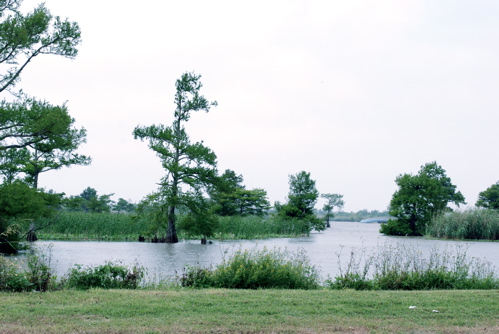
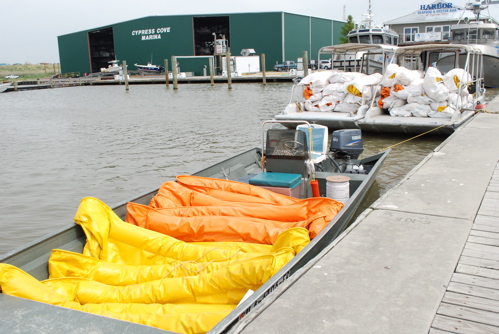
Venice, LA, First Week in May 2010
As someone who was in Venice, Louisiana during the first week in May, this writer can tell you that the symptoms are real. In fact, we did not know about this report until speaking with Sister Helen today and then recalling contacting a physician about coughing, sore throat, sore eyes, and dizziness and before a scheduled trip to Haiti.The eye problems remain, but we are told they will diminish.
Questions remain and more surface everyday as the river of oil makes its way into Atlantic Ocean currents.
Today, the Louisiana Bucket Brigade issued a statement saying local groups are urging President Obama to make good on his vow to end what the President last Friday termed "cozy relationships" between the oil industry and federal regulators. The groups cite the BP oil spill and the high number of refinery accidents in the state, including potential Clean Air and Water Act violations, as the catalyst for the call. "The state Department of Environmental Quality has turned a blind eye to refinery accidents for at least a decade," said Anne Rolfes of the Louisiana Bucket Brigade. "We fear that what is happening in the Gulf could happen on land."
The data on which the groups base their claims comes from refineries' own reports to the Louisiana Department of Environmental Quality. Ten of the largest refineries in the state collectively averaged 10 accidents a week from 2005 - 2008.
The groups are sending requests for immediate federal investigations into refinery oversight to President Obama, the Environmental Protection Agency and chairs of the relevant Congressional committees. "This state is ground zero for the cozy relationships that Obama spoke of," Rolfes said. "We are requesting aid to bring those relationships to an end."
For more information about refinery accidents and the refineries with the worst accident rates, visit the Refinery Accident Database.
The bigger question is why Obama is not utilizing all of the military and civilian forces at his disposal to mitigate this disaster while the Coast Guard works as a private guard for BP.
Perhaps the administration is not willing to abandon its sacrificial goat, British Petroleum, and assume responsibility for this catastrophe and its impact upon the people of the Delta.
_______
For no-holds-barred updates on the oil catastrophe and colorful commentary, see the NOLA Ladder. This aggregate has been weeks ahead of mainstream news reporting since the explosion of the Deepwater Horizon.
.
